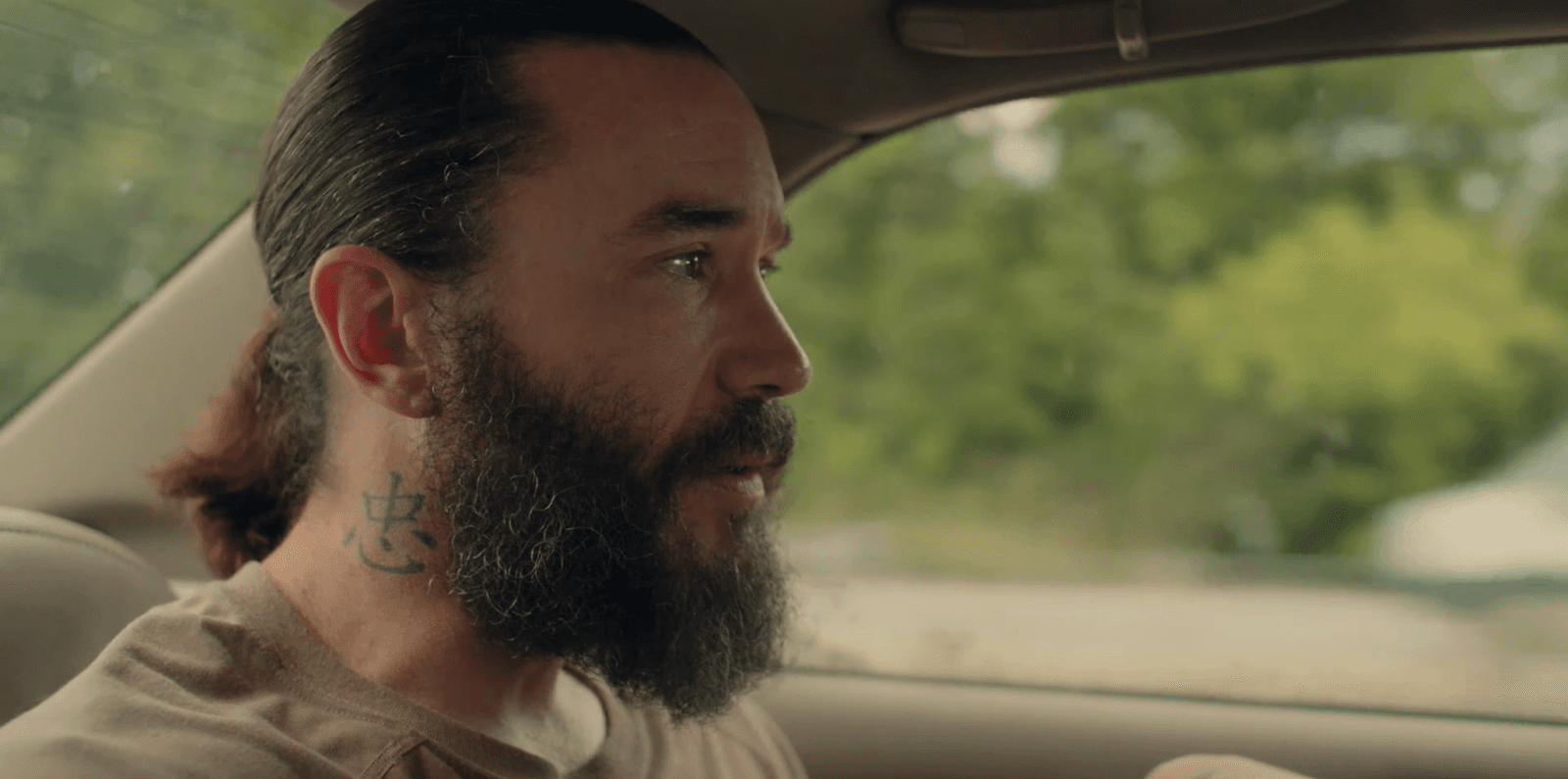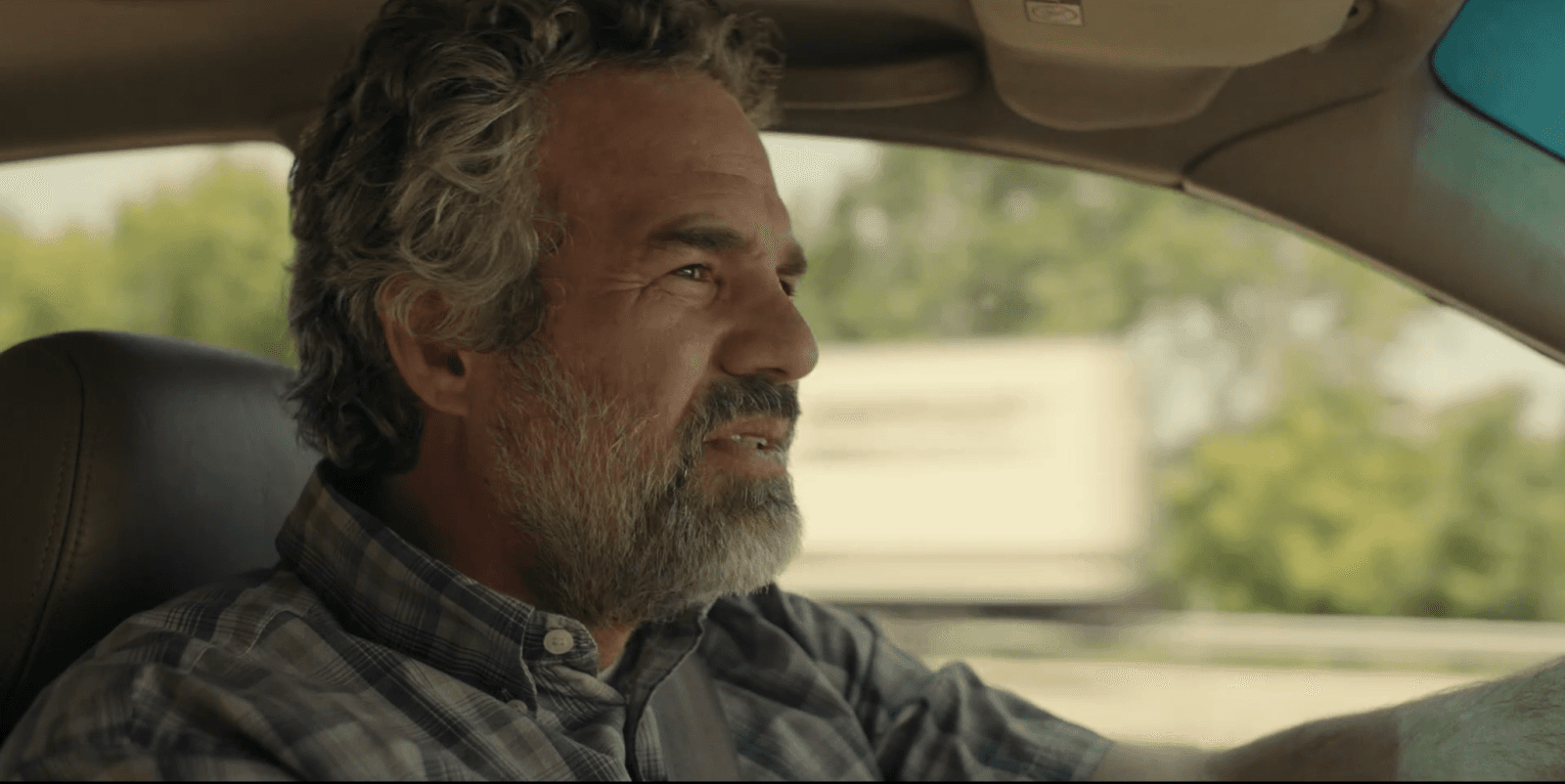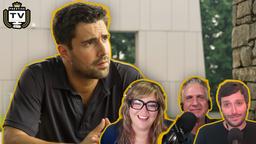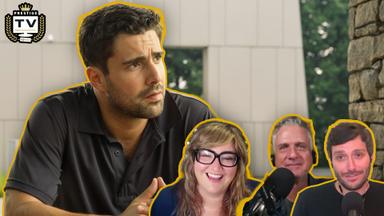
Tom and Robbie have been on a collision course ever since Episode 1 of Task. In Episode 5, “Vagrants,” they finally meet—not in a shoot-out or some climactic showdown, but in a tense, winding, cathartic conversation (and sure, it’s a hostage situation, too, but all things considered, a pretty mellow one). It’s the most meaningful set piece of the series so far, and it’s a chance for the characters to finally get to know each other in the way the audience has gotten to know them all season. And, blissfully—but to no one’s surprise—Mark Ruffalo, Tom Pelphrey, showrunner Brad Ingelsby, and episode director Jeremiah Zagar land the plane: Tom and Robbie’s scenes together are a highlight and a grace note for both characters before everything, inevitably, goes to shit.
You know those times when you feel like you can finally exhale, only to realize, Wait, everything is still terrible? That’s how I felt watching Tom trudge up to the Prendergrast house: It’s a long-awaited payoff after we’ve seen these characters circle each other all season, but we know not much good can come from them finally crossing paths. When Tom gets there, Robbie is already desperate and scrambling, trying to get together what he needs to hand off his duffel bag of fentanyl to Freddy Frias. Thanks to Eryn, he knows the deal is more than likely a Dark Hearts death trap, but he’s rushing into it anyway—and now he’s had another ambush spring-loaded onto him before he could even walk into the first one.
Tom tells Robbie that he’s looking for Maeve so he can ask her about Billy’s disappearance; he puts on an act that he’s some dopey paper pusher, stalling until Grasso can get there to back him up. Tom probably knows he isn’t fooling Robbie, although he puts his all into hobbling around and using a conveniently placed Pepsi can to buy time when he’s “using the bathroom.” He asks for Maeve’s phone number and a hair sample from Billy as Robbie twitches and sweats and tries to come up with some way to get out of all this (good luck with that, bud). Then, of course, everything comes to a head all at once: Tom gets the police sketch confirming that Robbie’s the one who kidnapped Sam, just as Robbie gives up his act and pulls out a gun.
But Robbie isn’t really done putting on an act yet. As he pushes his gun into Tom’s back and walks him to the car, he comes off like an animal of prey pretending to be a predator. We’ve seen him kill somebody once, back when he shot Derek Nance in Episode 1, but that was to save Cliff; it’s hard to imagine him killing an FBI agent in cold blood, regardless of whether he’s backed into a corner. Even his shit-talking to Tom feels like a put-on. It’s not even all that mean: He calls Tom a “baby giraffe” and a “little sneak,” insults that seem more like they’d come from banter with his son, Wyatt, than the threats of some hardened criminal.
When Robbie guides him to his car, Tom tells him—just in case he didn’t know—that it’s a pretty bad idea to kidnap a federal agent. Robbie responds that he’s “a million miles past good ideas”; at this point, he’s running headfirst into self-defeat, but he seems to think it’s the only way forward—and now Tom’s along for the ride. Robbie has him take the wheel, and they head north together on Route 100 to his appointment with the Dark Hearts.
What they might not have bargained for when they set out on their little road trip is something every teenage girl knows all too well: It’s easiest to bond with someone else when you can’t look them dead in the eye. As Tom and Robbie take their ride to Bushkill together, they’re both looking straight ahead instead of at each other, framed in their own small space in the car:


One of them could almost stand in for the other as they start to let their guard down and, just maybe, realize how similar they are. Robbie fills the space with some music, but they can’t help but fall back on a road-trip pastime: the unburdening of secrets. Robbie plays into Tom’s charade about why he was at the Prendergrast house in the first place; he tells Tom that Billy is dead, not missing, which was “what started this whole thing,” and that Cliff is dead now, too. Robbie’s handing over information that Tom may well already know, but he wants to say it out loud anyway, now that there’s not much to lose and he has a captive audience. Tom responds by asking the obvious questions: what’s in the duffel bag (“Basketballs,” Robbie says) and whether it has anything to do with where they’re going (“Yeah, we’re going to a pickup game”). Robbie’s ribbing him like he used to rib Cliff; he’s not all that interested in giving more details about the spiraling crime scene he’s in the middle of. If you’re headed to the end anyway, why not just talk to each other like real people?
It could be that Robbie’s just talking because he wants to distract himself, but maybe he really is starting to enjoy Tom’s company as he asks questions about his family and his job. Tom plays along, telling Robbie that he and his wife, Susan, met at a hospital where she was a patients’ rights advocate and he administered the last rites. At first, she hated him because he believed in life after death, but he still pursued her and, obviously, won her over. It’s a good story—who can resist a tale of a Catholic priest led astray by love?—and Robbie, eternally a romantic, gets caught up in it, ultimately siding with Susan on the life-after-death debate: “I never once felt God in my life,” he says. “And I think people wanna believe that there’s more than this, ’cause if this is really all there is, then that’s too fuckin’ depressing for some people, you know. But there’s nothing else after this.”
The subtext (that’s basically just text) is that both Robbie and Tom are getting closer to death on this car ride. But it’s interesting to look at the mess Robbie’s made in light of the revelation that he doesn’t believe in an afterlife. If he really thinks his brother was erased forever because of Jayson, it makes sense that he’d want to lash out and get some kind of justice. Still, it’s honestly a little hard to take him at his word. A part of me wonders whether Robbie’s recklessness amounts to a death wish—maybe, at bottom, he’s been hoping that all these robberies would eventually land him closer to wherever Billy ended up. Back when he told that story to Wyatt in Episode 1 about Billy riding a dragon up into the sky, it sounded like Robbie was convincing himself that his brother had gone to some higher plane. And the way he talks about those far-off Canadian islands makes them sound a lot like heaven, an impossible idyll you have to work to get to.
Tom, who’s been pretty ambivalent about the existence of God and eternal life himself, seems to be pushing Robbie to have a healthy fear of death. He launches into his grand metaphor of the summer tanager, a vagrant who got off course and ended up in Tom’s backyard, way out of season. “It’s a bird that strayed outside its normal range, strayed so far that it’s forgotten how to find its way home. Most of them don’t survive,” he says. Robbie, obviously, is the one who’s way out of his normal range. He’s a family man, an occasional romantic, a good pal, a dreamer—not a criminal.
Ringer editor in chief Ben Glicksman pointed out to me a possible connection between Task and the work of Richard Rohr, a priest and writer who got a passing mention in Episode 1. Rohr talks about the two “tasks” of life in his book Falling Upward: The first task involves “establishing an identity, a home, relationships, friends, community.” That’s like the home Tom is pushing Robbie to go back to. The second task is what you do when the first one falls apart and you have to figure out who you are, and how you’re going to move forward, with what’s left. But that doesn’t mean leaving the first task and everything you used to value behind altogether: “Home is both the beginning and the end,” Rohr writes. It seems like Tom might have left his Rohr-reading days behind him, but he echoes those words when he says, “You can still go home.” Obviously, it won’t look like it used to, but if Robbie turns himself in, he can still keep a connection with his family and with who he used to be; if he goes forward with his plan, he’ll probably lose any chance of that. Robbie has to decide on his second task right now: What’s he going to do when he feels like he’s got nothing left?
In their last scene together, Robbie and Tom both come back to some former “home” version of themselves. Robbie gets Tom to take a quick exit off the highway and then forces him out of the car once they’re way out in the woods. Tom seems to think that Robbie’s planning to kill him—and honestly, he seems resigned to it. There have been plenty of times this season when it would be reasonable to think that Tom wants to die; he’s been living in a drunken twilight, avoiding his family and drowning his troubles. But when he thinks he really is close to the end, he asks Robbie to pass along a message to his son. Then, Robbie turns the tables, letting Tom go and asking him to look out for his own neglected relative, Maeve. Tom’s not the one who’ll be dying today (not in this episode, at least), even if he’s come to terms with it. I never really thought Robbie would kill him, but showing mercy is his own way of coming home to who he is. Likewise, Tom coming back to the thought of his son is a way of circling back home, even if it’s not what it used to be. Faced with the worst, they both come back to themselves and what they have left. But Robbie still decides to go off in the other direction: “Even if I wanted to go home, I don’t know the way no more.”
Tom and Robbie’s scenes together surely aren’t quite as eventful as the standoff that’s brewing between the FBI and the Dark Hearts. But it’s the real payoff Task has been building to, and it’ll hang over everything that happens next. Even if their conversation doesn’t change the outcome for them or anyone else around them, it was still necessary for each character and for the show—to get their big feelings out and, maybe, to realize they can extend another chance to themselves, as well as each other.


